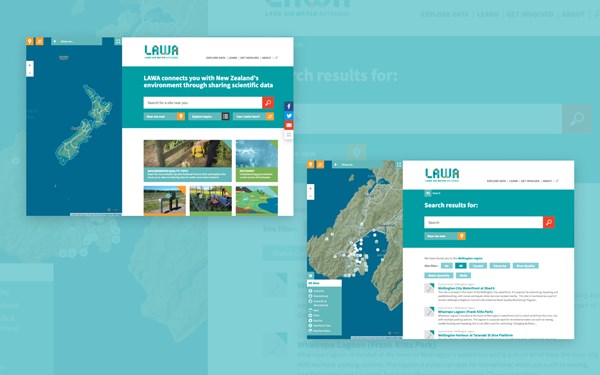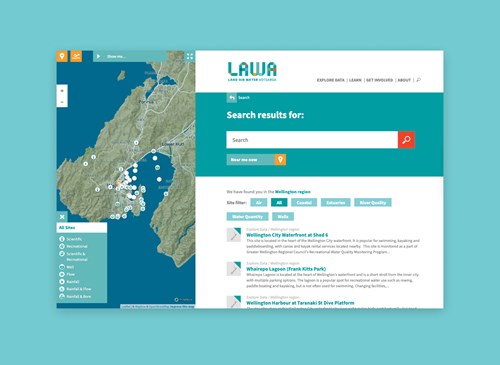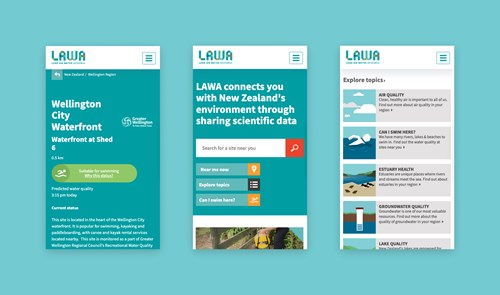
Technology that Matters
19 December 2023 Lesley Walls
As summer approaches and we gear up for our well-deserved holidays, one thing is for sure - Kiwis love the water. Whether it's the pristine beaches, meandering rivers, or tranquil lakes, the allure of the water over summer is strong. However, before you dive in headfirst, there are essential factors to consider, and one of them is the water quality. We'll explore a project I was proud to be a part of and why checking water quality is crucial, where to find the latest information, and how it impacts not only our health but our furry friends as well.

Regional and unitary councils monitor water quality at around 850 popular river, lake and beach swim spots across New Zealand. Monitoring is done during the warmer summer months, and results are assessed using national guidelines for swimming water quality.
Data is updated automatically on LAWA as the results come in, so you can see the most recent results, as well as the long-term results to get an idea of the overall condition at swim sites, when deciding when and where to swim this summer.
During the swimming season (around November/December to February/March), councils and public health agencies assess the health risks from faecal (‘poo’) contamination at swimming spots by carrying out regular water sampling.
At some river and lake sites, toxic algae is also regularly monitored. In these aquatic environments, cyanobacteria can multiply and form blooms suspended in the water or dense mats attached to rocks on river beds. Blooms are more common during the summer months, when low rainfall, warm temperatures, the right level of nutrients and more sunlight create an environment where it can thrive. These natural toxins can be a threat to humans and animals when eaten, even licked, or when water containing the toxins is swallowed. Exposure to high levels of toxins from cyanobacteria may result in serious illness or death in humans and animals. Dogs are at the most risk as they like to play and scavenge in the water.
Signs a dog has been poisoned by toxic algae include lethargy, muscle tremors, fast breathing, twitching, paralysis and convulsions. If you suspect that your dog has eaten toxic algae, you should treat it like an emergency and contact your vet immediately. In extreme cases, death can occur within 30 minutes after the first signs of illness appear.
The results of water sampling and toxic algae monitoring are combined to provide a snapshot of what the water quality was like at the time of sampling. Sites in the Auckland, Northland and Wellington regions are modelled to predict water quality. This provides a 'real-time' prediction about the current water quality at a site. The quality of water is determined by analysing various factors such as bacteria levels, nutrient content, and the presence of harmful substances. These parameters provide a holistic view of water quality.

The information about water quality is not static. It's regularly updated throughout the day to reflect current conditions. This allows swimmers to make informed decisions based on the most recent data available.
Some water bodies have long-term risk grades, either positive or negative. These grades offer insights into the historical quality of water in a particular location. A positive long-term grade means consistently good water quality, while a negative grade indicates persistent issues.
Councils can also add warnings and alerts to specific swim sites to raise awareness for potential health issues such as the existence of potentially toxic algae.
Check www.lawa.org.nz/swim for latest water quality and warnings and alerts.
LAWA has a number of factsheets covering various topics related to environmental monitoring. For example, Coastal and freshwater recreation monitoring and Factsheets for Toxic Algae
While the allure of New Zealand's waters is undeniable, safety should always be a top priority. Before heading out for a refreshing dip, make it a habit to check water quality and be aware of potential hazards. The LAWA website is a valuable resource for staying informed and ensuring a safe and enjoyable experience. By doing so, you can make the most of your summer adventures and keep your health and the well-being of your furry friends a top priority. Enjoy your Kiwi summer to the fullest but do so responsibly!
Report whale or dolphin strandings to the DOC emergency hotline 0800 DOC HOT (0800 362 468) or to the Project Jonah 24 Hour Stranding Hotline 0800 4 WHALE (0800 4 94253)
Signup here if you want to keep up with our quarterly newletter